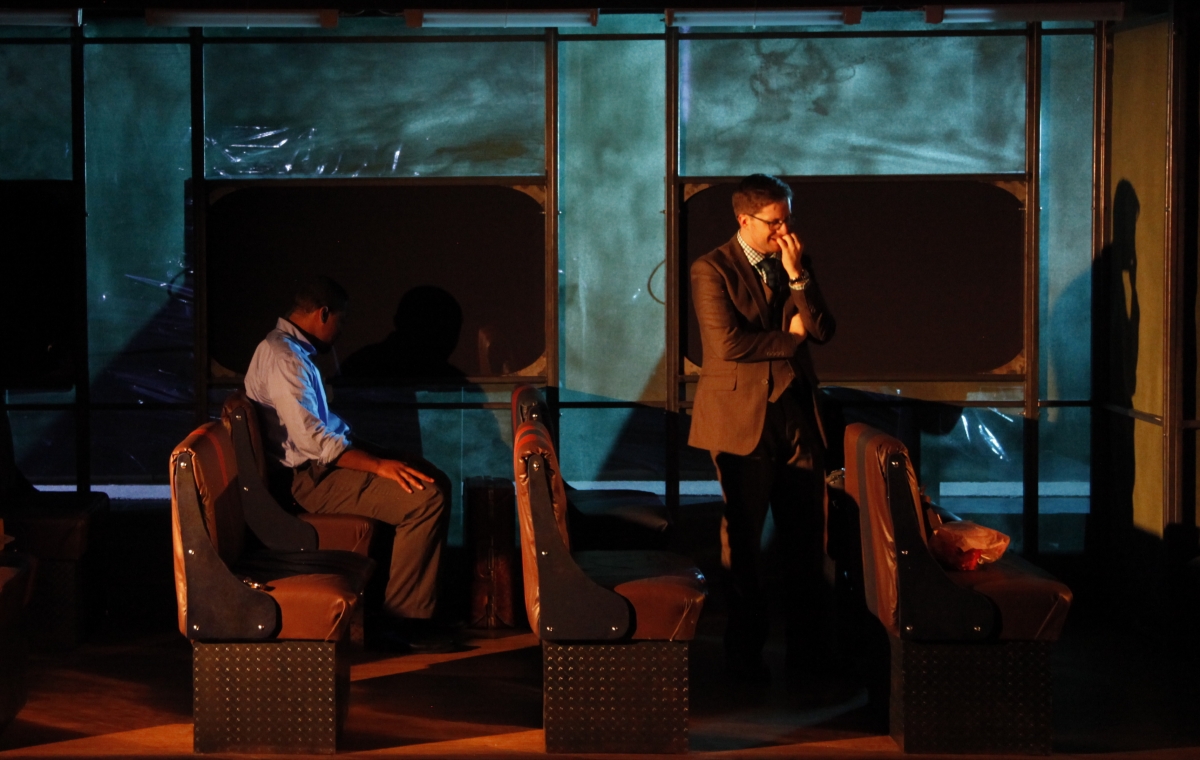
That Poor Dream was written and developed collectively by the members of the Assembly Theater Project, which describes its goals as creating performances that both "address the complexities of our ever-changing world" and ground artists and audience alike in “a profound sense of community.” The play transposes Charles Dickens's novel Great Expectations onto the social topography of current-day New York City, recontextualizing the social and economic rise and fall of the original, Dickensian Pip in a world of penthouse apartments and $1,000 omelets, a move that highlights that while the world may be "ever-changing," the class systems of Victorian England and the twenty-first century United States remain closer and more rigidly exploitative than we like to tell ourselves. Indeed, the Metro-North train that serves as the play’s setting (and most of the set) could be seen as a metaphor for, among other ways of looking at the course of a life, the determinism of a society in which, Pip's heretofore secret benefactor Magwitch tells us, one can be only either a shepherd or a sheep.
Although inspired by the events and discourse surrounding the Occupy movement, That Poor Dream is not a dour treatise on how bettering oneself results merely in being rich, not being better. Class commentary certainly underpins much of the narrative. Magwitch (Terrell Wheeler) has amassed his fortune by running a collection agency, for example, and he discovers to his dismay that buying Pip (Edward Bauer) membership in the east coast elite has led to complacency rather than to the greatness he had hoped for from him, and maybe not even to happiness. If wealth does lead to happiness here, that happiness is almost necessarily built upon the misery of others, regardless of intentionality. But the drama is rooted in the emotional as much as the economic, in the heated negotiation of a relationship between Pip and Magwitch; in the fractures between Pip and his computer repairman brother-in-law Joe (Moti Margolin); and, perhaps centrally, in the dynamic among Pip, Havisham (T. Ray Campbell), and Estella (Jocelyn Kuritsky), relationships that are exploitative in ways that have nothing to do with money but everything to do with power and control. Havisham and Magwitch mirror one another, as do the damaged Estella and the seemingly emotionless, all-business lawyer Jaggers (Emily Louise Perkins). As the train on which Magwitch reveals himself speeds towards Connecticut, the audience watches Pip's present and past interweave themselves, aided by clever use of the car’s windows as screens whose images vary from verisimilitude -- the landscapes through which the train progresses will be familiar to riders of the New Haven line -- to surreality.
The cast all give impressive performances. Bauer and Wheeler as Pip and Magwitch ably anchor the play as it skips through time. Campbell’s Havisham, whose scenes are closest to those from Dickens, is appropriately otherworldly, unsettling, and controlling. Kuritsky shows the vulnerability under the strong and coldly seductive Estella that is so often absent from more traditional adaptations of the novel. Ben Beckley plays a menacing, arrogant, and abusive Nantucket-red wearing Drummle without quite crossing over to a parody of the type, and the poor but proud Joe is appealing and sympathetic, so much so that his fleeting appearance in a backdrop to a scene -- suggesting that things are worse for him than he has let on -- elicited gasps of dismay from a good three-quarters of the audience. Even Jaggers develops quirks that move her character beyond potential one-dimensionality. Late in the proceedings, Pip delivers a nice twist on the panhandling pitches familiar to riders of public transportation, and the play takes an unexpected turn near the end, which we won’t spoil here but which could be described as sincere and heart-breaking, though with a core of resilience. In all, That Poor Dream is a rich experience. - Leah Richards and John Ziegler
